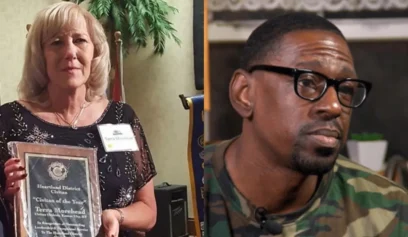An acclaimed Black author noted for penning one of the first neo-slave narratives, “The Autobiography of Miss Jane Pittman,” has died.
Ernest Gaines, 86, “rose to prominence through his nine novels and several short stories reflecting the lives of African Americans, Cajuns, and Creoles living in the rural South,” an international research center named in his honor said Tuesday in announcing his death.
He died peacefully on Nov. 5 at his home in Oscar, Louisiana, with his wife Dianne Gaines present, according to the center.
His death sent shock waves through the Louisiana literary community.
“The legacy that Dr. Gaines is leaving behind is nothing short of brilliant and awe-inspiring,” the Ernest J. Gaines Center said on its website.
Louisiana Gov. John Bel Edwards tweeted his condolences Tuesday.
“It is with a heavy heart that we say goodbye to Ernest J. Gaines, a native Louisianan who used his immense vision and literary talents to tell the stories of African Americans in the South. #lagov #lalege,” Edwards said in the tweet.
Gaines, the first Louisiana Humanist of the Year, a MacArthur fellow and a Medal of the Arts recipient, saw his work translated into more than 14 languages, the Gaines Center reported.
“‘A Lesson before Dying’ spent time on top of several literary bestseller lists and Oprah Winfrey’s 1997 book club,” the Center said.
The son of sharecropper parents, Gaines spent his early years on a Louisiana plantation, witnessing first-hand the oppressive conditions and limited opportunities many of the grownups he knew had to deal with, according to The New York Times.
“At an early age I used to write and read letters for them,” he told The Boston Herald in 1999. “In that way I got to learn their stories.”
Writing in the 1960s, Gaines veered away from a popular focus on militant civil rights action, according to The Associated Press.
“When Bull Connor would sic the dogs, I thought, ‘Hell, write a better paragraph,’” he said.
“In 1968, when I was writing ‘The Autobiography of Miss Jane Pittman,’ my friends said, ‘Why write about a 110-year-old lady when all of this is going on now?’ And I said, ‘I think she’s going to have something to say about it,’” Gaines said, according to The Associated Press.
Gaines spent more than three decades working in the Creative Writing program at the University of Louisiana at Lafayette until he retired in 2010, the Gaines Center reported.
“Though he touched countless people through his work, to know him was to love him,” the Center said. “A towering man with a gentle voice, Dr. Gaines was an inspiration to generations and his death will be felt deeply by family, friends, and his University family.”


